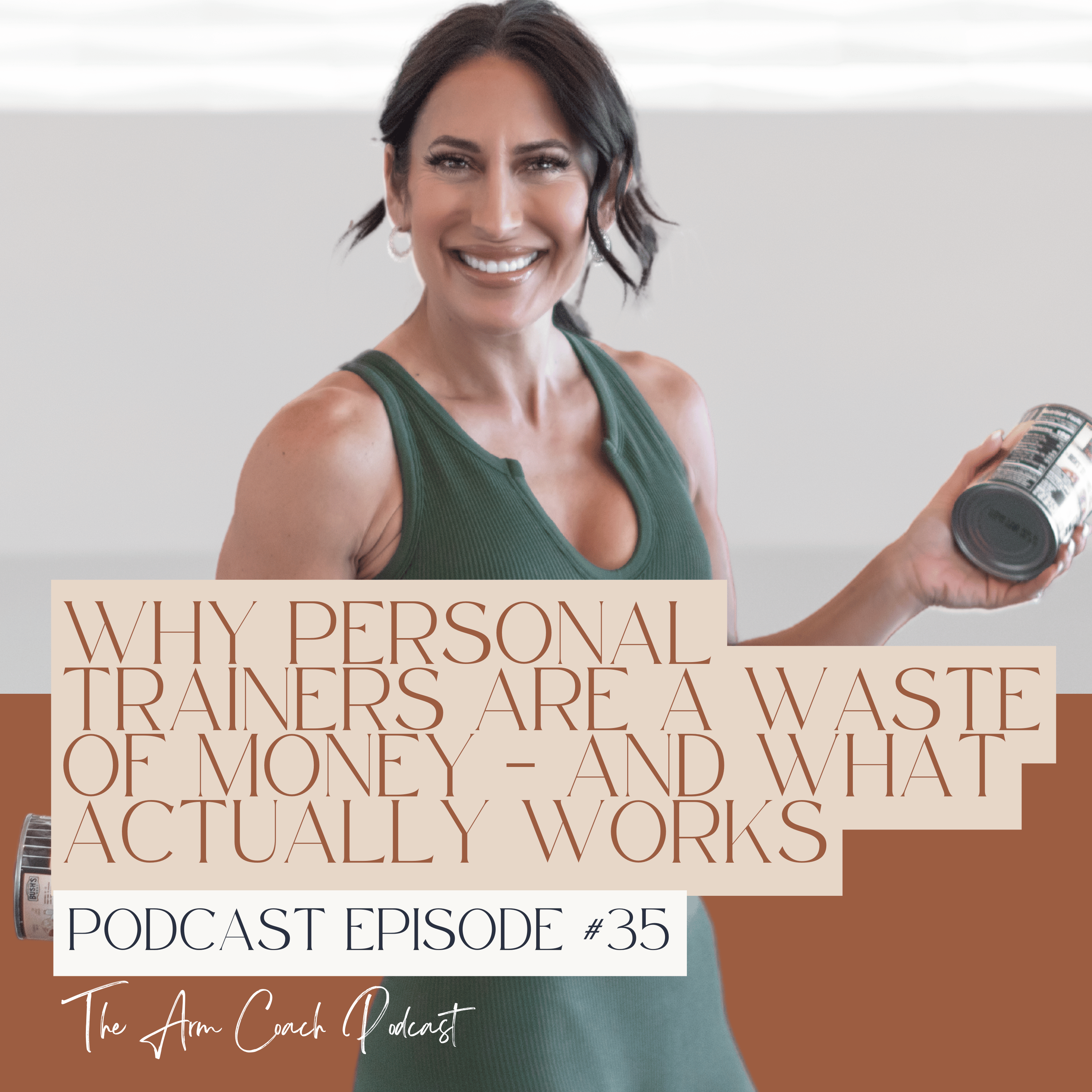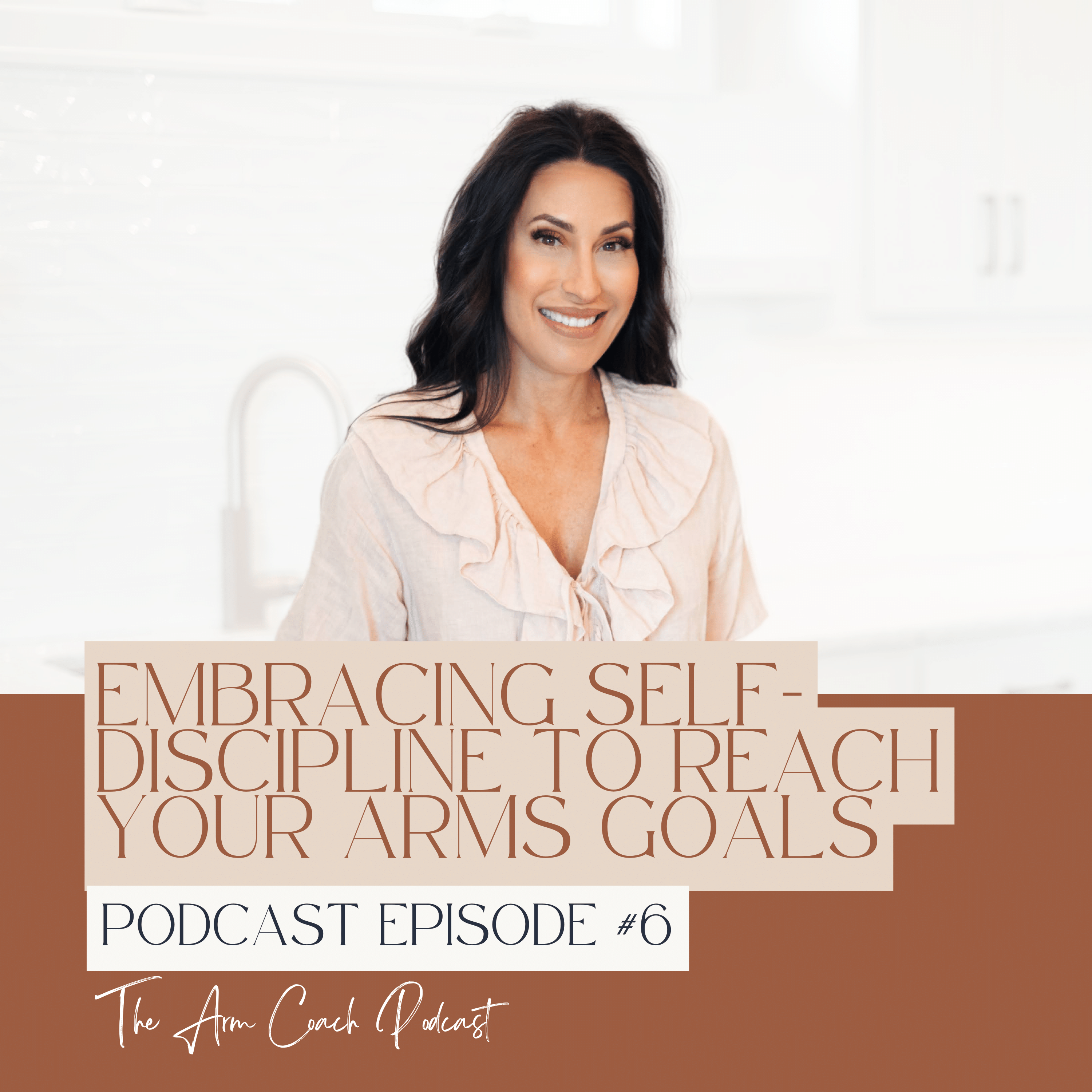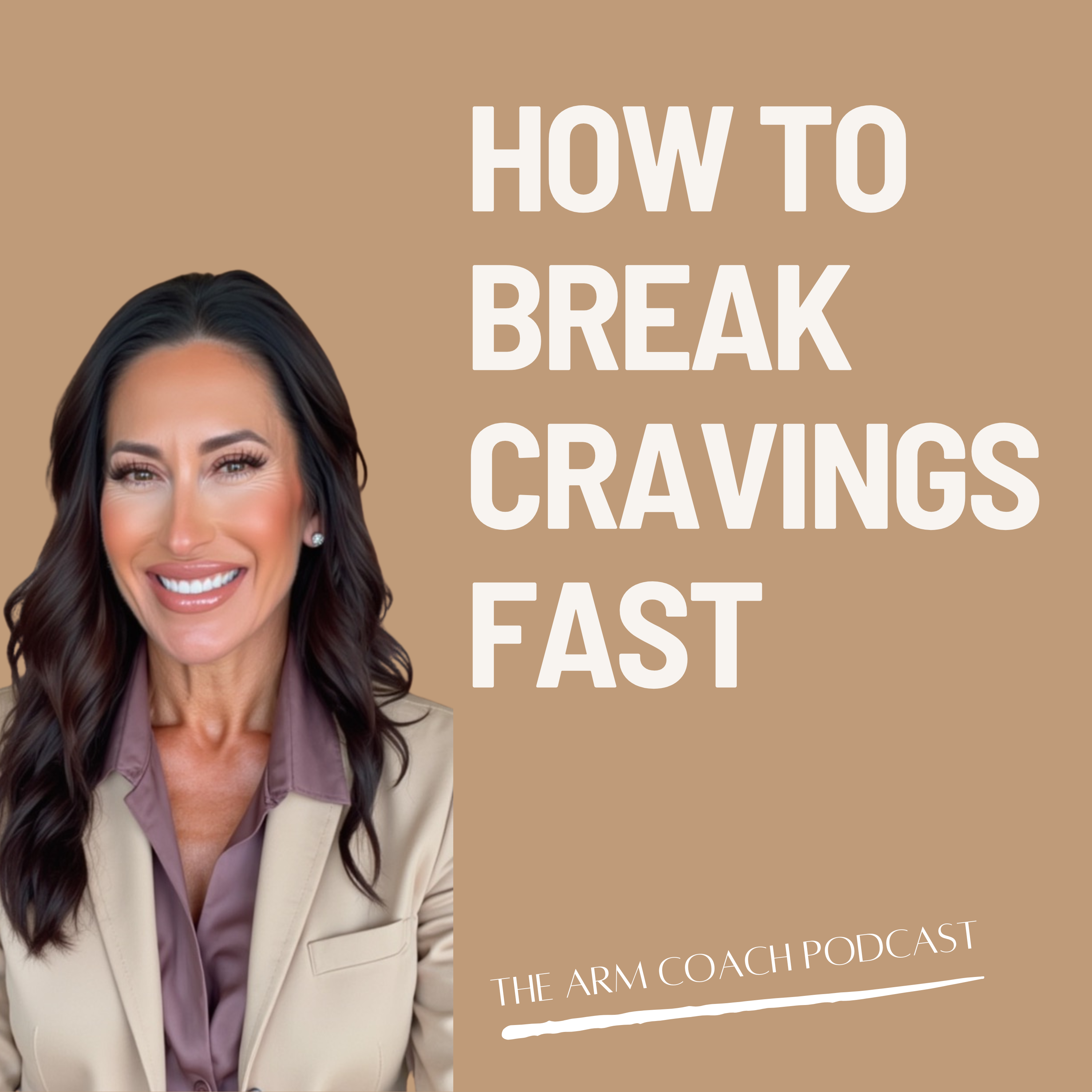Episode Transcript
You’re having a
conversation with yourself
all the time. But what if the
questions you’re asking
yourself are keeping you
stuck?
In today’s episode, we dive
into one of the most
powerful — and overlooked
— habits shaping your
mindset, your motivation,
and your results: the habit of
self-questioning.
Hey everyone! Welcome to
The Arm Coach podcast,
episode 57! Today, we're
going to talk about a habit
that I would bet you have.
And that is the habit of
asking yourself questions.
You and I and everyone I
know, we're probably having
a conversation with
ourselves, just about all the
time. We do it all the time,
it's part of self talk. And it's a
way of thinking things
through, sorting things out.
It can definitely be helpful if
you know how to do it
correctly. But it can
definitely take you in a
direction that you don't
really want to go if you
don’t know how to do it
correctly. So what we're
going to talk about today
will help you take a look at
what you're doing, inside the
privacy of your own mind,
and we're going to take a
look at your self talk. And
really take a look at what it
is, and how it happens, and
how you would define it.
And then we're going to look
at the questions that you ask
yourself. A particular type of
self talk. But instead of just
beating yourself up about
something or patting
yourself on the back about
something, I think you may
be in the habit of asking
yourself some questions over
and over and over again.
We're also going to take a
look at the most common
question you might ask
yourself, which
unfortunately happens to be
the most negative. And we're
also going to take a look at
another type of self talk. It's
like the next level of self
talk. And there's a 50%
chance that it could be
helpful. And there's also a
50% chance that it could be
harmful. And then I'm going
to share with you the best
type of question you can ask
yourself, and how to
cultivate it as a habit, and
exactly what it would sound
like. We're going to look at
different ways that you can
form questions in your own
mind, so that you can
actually lead yourself to an
answer, instead of running
around in a circle of
confusion.
So let's start with self
talk. Self talk is simply our
thoughts in our mind
about any particular
subject. It has a
tremendous influence on
you. Whether you're
aware of it or not. The
way that you talk to
yourself, is just as if you
were thinking or speaking
to somebody else. And
what you think the things
you're saying in your own
mind, that's what creates
your emotions, your
feelings. And when you
have emotions, you know,
that leads you to what
you do. So your thoughts,
your self talk, lead you to
your feelings, and they
lead you to what you do
in the world. So what you
say to yourself, even if
nobody else hears it but
you, absolutely counts,
And if you're anything like
me and everyone else I
talk to, you probably have
an ongoing conversation
with yourself just about all
the time. When we
meditate, what we're
doing is watching those
thoughts, that
conversation, go through
our head, but we're not
attaching to it. We're not
jumping in and engaging
in the conversation.
These thoughts that you
think, again, again, again,
particularly the repetitive
ones, they have the ability
to literally create your life,
whether you are aware of
it or not. Everything you
do comes from your
feelings. And every
feeling state is coming
from what you're thinking.
So you know, at this
point, if you've listened to
past episodes, that’s the
whole purpose of our
work together, and these
coaching sessions, is to
become really conscious.
And really intentional with
what you're thinking, so
that you could have a
much bigger say in the
results that you're getting.
Whether the result is what
your number on the scale
is, how much muscle is
on your body,
or how you feel about
yourself, or the type of
eating that you do or how
you take care of yourself.
Those thoughts affect
everything.
Now, you may remember
that it used to be pretty
popular to say positive
affirmations to yourself.
And an affirmation is just
a sentence in your head,
just like any other
thought. But an
affirmation, in particular,
is positive. So, you might
remember people buying
audios that would say, ‘I
am very smart. I am
capable. I can handle
anything’. You know, they
were kind of teaching you
a better way of talking to
yourself. For most of us,
they didn't work. They
were not so helpful
because no one ever
taught you how to
uncover the thoughts that
you already had in your
head, that were
unconsciously holding
you back. And these old
thoughts that you have,
without being aware of
them, they were in direct
opposition to those
positive affirmations that
you were trying to plant in
there now. So we're not
going to do that. But what
I want you to do now is
take a look at your own
self talk. And I want you
to consider it as being
supremely important in
your life. And now that
you're becoming aware of
it going on, you may
already be aware of it, but
I want you to be aware of
it even more. Now you
will make it conscious,
instead of unconscious.
And if your thoughts are
more conscious, then you
get to decide which ones
you follow and which
ones you don't.
So does that mean that
you can now suddenly
learn how to control all
your thoughts? No, it
does not. Thoughts come
and go. We can’t control
what comes into our
mind, but you get to
decide what you believe.
And you get to decide
what you make things
mean. And whether you
grab onto those thoughts
or not. And whether you
grab onto them,
determines what you do,
right? What actions you
take.
So let's look at one type
of self talk. And that is
questions, in particular. A
type of self talk where you
keep asking yourself,
usually the same set of
questions, over and over
again. Why do you do
this? Because you're
looking for an answer.
You're hoping for a good
solution. But you're just
doing it out of habit.
You're not really paying
attention to the content of
the questions you're
asking yourself. And it's
easy to become really
frustrated, because when
you ask these questions,
it’s like a continuous
beating of yourself. As in
when you ask yourself,
‘Why did I blow off my
workout? Why did I eat
the whole thing? Why did
I finish that?’ When you
ask yourself a question,
your mind will naturally go
to look for an answer. But
when you ask a bad
question, you will most
likely get a bad or
negative answer. When
you ask a good question,
you might get something
much more useful. The
way I see it, is that there
are three types of
questions you probably
ask yourself. One will
definitely lead you away
from what you want. One
has the possibility of
helping, but an equal
chance of also hurting
you. And one will help
you solve your problem.
Whatever it is. So when it
comes to toning your
arms, the type of question
you ask yourself in your
own head, even if nobody
hears you, is very
important.
So let's take a look at the
three types of questions,
and why they hurt, and
why they help. And as I'm
talking about this, I want
you to look into your own
mind, and maybe jot
down the types of
questions that you are in
the habit of asking
yourself.
Now the first, most
common type of question
that you probably ask
yourself, is the negative
question. Why can't I do
this? Why can't I lose
weight? Why can't I stop
eating? Why can't I do
what I say I'm going to
do? Or why can’t I keep
my promises to myself?
You ask yourself this
simple, little, innocent
question. But your brain
is like a computer. And it
goes to seek the answer
in the storage part of your
brain. Now your brain
doesn't have a good
answer if you have never
been able to conquer
toning your arms or
overeating or emotional
eating. So your brain
instead, has lots of
evidence to support the
thought, I can’t do this. If
you take the question,
and take away the
question mark and the
word why, then you have
statements that are
beliefs. ‘Why can't I do
this’ becomes ‘I can’t do
this’. ‘Why can't I stop
eating’ becomes, ‘I can't
stop eating’. ‘Why can’t I
keep my promises’
becomes 'I can't keep my
promises’. So with those
kind of question, slash,
statements, your mind
goes to look in the
storage part of your brain.
And all it finds is
evidence. Proof.
Examples. And lots of
them, why you can’t do
whatever it is you're
trying to do. And it'll give
you an answer. Not a
good answer. ‘You can't
do this because you're
not smart enough’, ‘you
can’t do this because
something is wrong with
you’, ‘you can't do what
you say because you are
broken’, ‘you can’t keep
your promise. You never
have and you never will’.
This question helps keep
you where you are. And
where you are is not
where you want to stay.
So the first thing you
want to do is when you
catch yourself asking that
negative “why” question,
‘Why can't I’, catch
yourself, and stop. And
we're going to come to
the kind of question that
you should ask, but first I
want to tell you about
another question that
most likely will not get
you where you want to
go. It's a next level
question. It sounds a little
bit better, but it may not
be. So the worst question
is ‘Why can't I’ blank. The
next level question is,
‘Can I?’, Can I tone my
arms? Can I lose weight?’
‘Can I stop eating? Can I
do what I say?’ ‘Can I
keep my promises?’ ‘Can
I stick to a plan?’ The
reason this question
sounds a little better, is
that it kind of gives you
hope. Right? It sounds
hopeful. But the reality is
that 50% of the answer
that your brain is going to
look for and give you, is
negative. Because your
brain will go to all that
evidence that we just
talked about, about why
you cannot do this. And
that's what it will feed
you. Reasons why you
can't. Can I? No. Your
brain will come up with a
no. Now there's a 50%
chance that your brain
may come up with a yes.
But if it searches in your
memory banks for
evidence to support the
belief, Can I do this? Yes,
Yes you can. You want to
believe it, right? But when
you go and look for
evidence to back up the
belief that you can do
whatever you're trying to
do, you're not going to
find it if you have not
been successful yet. So
you go from hopeless to
hopeful, but it's hard for
one to balance out the
other. So this question
does not really take you
where you want to go.
So, again, you're going to
catch yourself when you
ask yourself over and
over again, Can I do this?
Is it possible? Can I
really? Can I trust myself?
Can I stick to this? and
pause. That's not your
helpful question. So when
you talk to yourself,
remember that everything
you're doing up to this
point, is learned. You
were not born with that
question in your mind.
You learn that question.
You learned Why can't I
do this? and you learned
Can I do this?. And then
you've practiced them
again and again and
again, until they just
became what feels very
natural for your internal
talk.
But I want to give you a
better question. A much
better question, that if
you catch yourself with
the other two questions
often enough, and you
pause
and replace them with
this question, you will
truly be able to change
the way you think, which
will change the way you
feel, which will change
what you do. And that's
your goal. So the
question is not, Why can't
I do this? The question is
not, Can I do this?. Here's
the question. The
question is, How can I do
this? Or What can I do?
With those questions,
your brain seeks answers
outside of your storage,
which only has evidence
that you can’t do it. Your
brain is like Google.
Searching the entire web
for proof that this can be
done. So even if you have
never succeeded before.
Even if you have never
done this. If you ask, How
can I stick to this plan?,
and you look for an
answer to that question,
what you will find are
different ways that you
could motivate yourself.
Different ways that other
people have done it, that
you might use as role
models. If you ask What
can I do?, and in a sense,
theoretically, not literally,
you would be Googling
that question, What can I
do?, your mind, in this
case will come up with all
kinds of suggestions for
things that you have or
haven't tried. But it's
giving you possibility. It's
giving you hope. It's
pointing you in the right
direction. And your
answers are unlimited.
Because the other two
questions, limited to what
your brain can find
evidence for in your
reality. In your past. In
what you've done. It
doesn't matter if you've
never done this before.
But if you ask those other
two questions, Why can't
I?, and Can I?, it will be
harder to push yourself. It
will feel like you are
pushing that boulder up
the hill. If you ask
yourself, How can I do
this? or What can I do to
get this done?, then it
simply becomes a
problem to be solved.
And a problem to be
solved is nothing to be
afraid of. And it's not
personal, it's not a
judgment against you. It's
simply a problem to be
solved.
In general, I don't advise
you to ask a lot of Why
questions. There are
some things that most of
us are curious about. We
tend to be curious about
ourselves, Why do I
always do that? Why do I
feel this way? Why am I
attracted to this kind of
person, or this kind of
food, or this kind of life?
Why do I work so hard?
Why can't I work hard?
Why questions, keep you
ruminating. They keep
you wondering. They
keep you pondering. But
Why questions may not
always lead to answers.
So this is your focus for
now. I want you to take
some time, and for a few
minutes every day, just do
a little check in with
yourself. Check in. How
are you doing? What's
going on? What are you
thinking? What are you
feeling? You know one of
the big ones is, are you
hungry? Is it time to eat,
or is it not. But instead of
just checking in with your
body as we do together
when we're looking to eat
from physical hunger, I
want you to focus on
what's going on in your
head. What are you
thinking? And are you
asking yourself the same
questions over and over
again, that are kind of a
form of beating yourself
up, verbally. I want you to
notice those questions,
and then don't beat
yourself up for having
them. It's like a double
beating. I want you
instead to just notice
them and be curious. And
you don't have to wonder
why you're doing it,
because again, that will
keep you stuck. But just
start reframing the
questions from Why do I
do this, or Why don't I do
this, or Why can't I do
this, to How can I do this?
or What can I change?
That will send you on a
much more positive,
productive search of
different ways that you
can solve your problem,
no matter what aspect of
exercise, or eating or
weight, your problem is.
I love to hear from you.
And if you find that it's
helpful and you've caught
yourself in a pattern, tell
me what you've found
your question to be that
kept you ruminating and
going nowhere. And then
tell me what your
question is that you've
changed it to. And does it
feel better? I am very,
very sure that it will. But
I'd love to hear from you.
So that’s it for today! See
you all next week!


